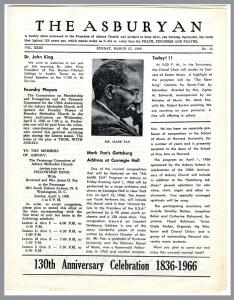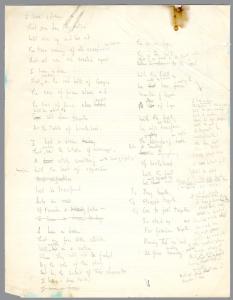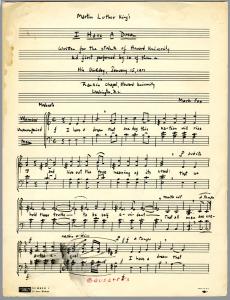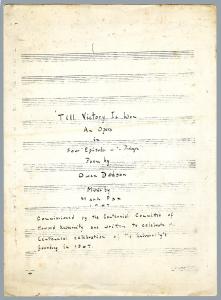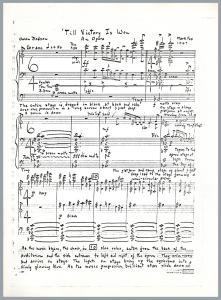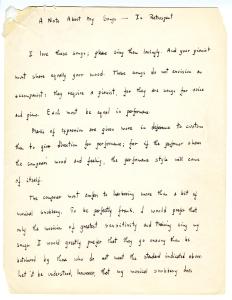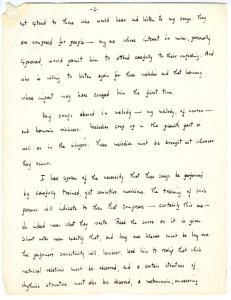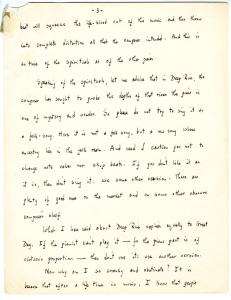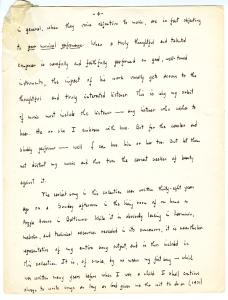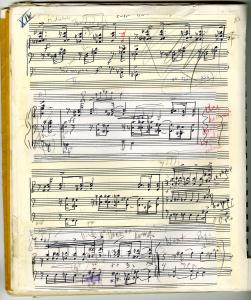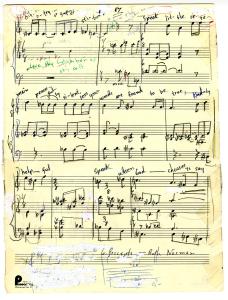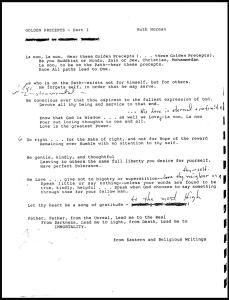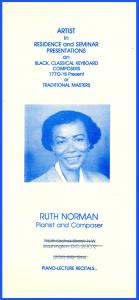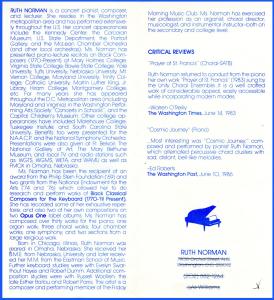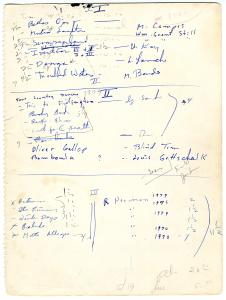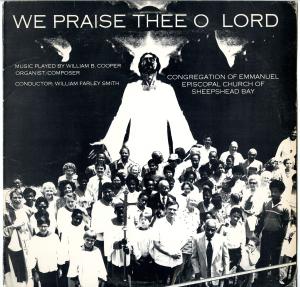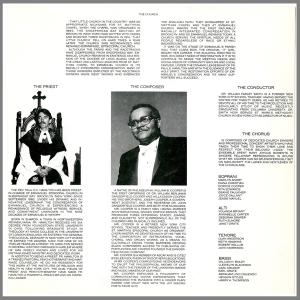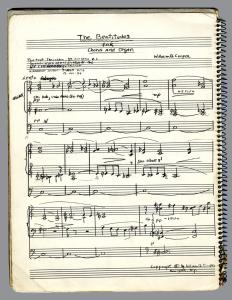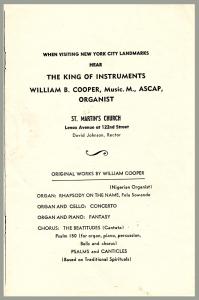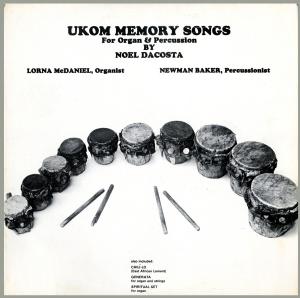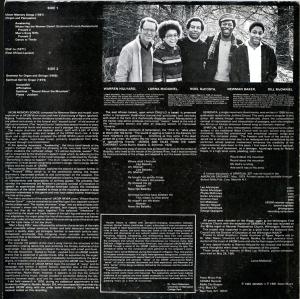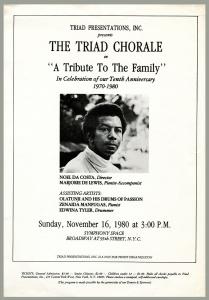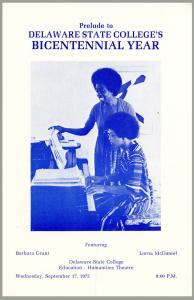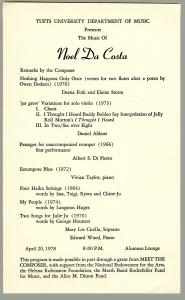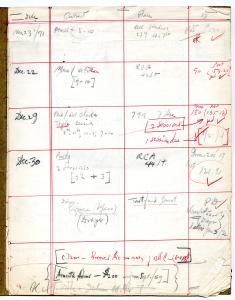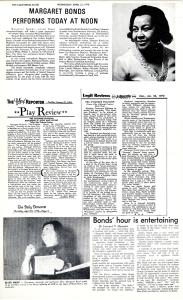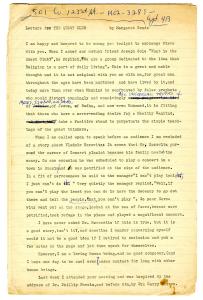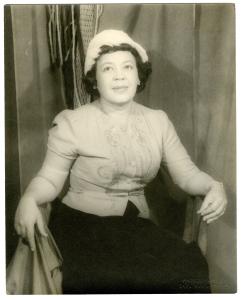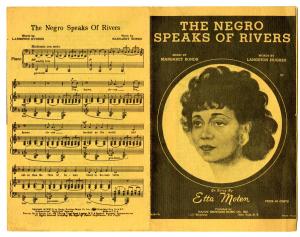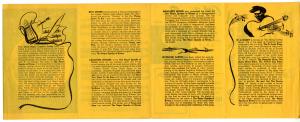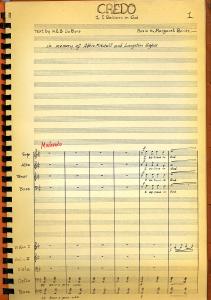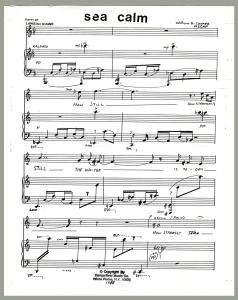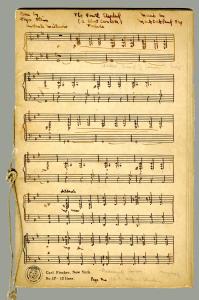For the past decade, the Booth Family Center for Special Collections has been collecting the works of prominent African-American classical composers and performers. Our current holdings include collections on Margaret Bonds, William B. Cooper, Noel Da Costa, Mark Fax, and Ruth Norman–all individuals who made impactful contributions to their local communities and the greater world of classical music. Our intention is to document, preserve, and make accessible the works of these artists, whose influence on classical music remains overlooked by musicologists and the general public today.
This exhibition highlights these composers and includes handwritten manuscript copies of their works. Accompanying materials such as album covers, programs, newspaper clippings, writings, and photographs provide context for both their musical output and their lives as Black composers and performers.
Mark Fax
A child prodigy who performed professionally in churches and theaters from the age of 14, Mark Fax (1911–1974) earned degrees in piano from Syracuse University and composition from the Eastman School of Music. He won the Julius Rosenwald Fellowship (established to support the “well-being of mankind”) twice and was a faculty member at Howard University's School of Music for 25 years. Fax served as music director for the historic Asbury Methodist Church and was an influential member of the Washington, D.C. classical music community. He composed organ works, three operas and pieces for piano, chorus, chamber ensemble, and orchestra.
The Asburyan newsletter, published by the United Methodist Church (Washington, D.C.)
1966
Mark Fax Papers
This newsletter features a photograph of Mark Fax and highlights an upcoming performance of his work based on the Gettysburg Address at Carnegie Hall. It also advertises a performance of many of Fax’s works as part of the Church’s 130th anniversary celebration in 1966. The church was founded in 1836 and is the oldest Black Methodist church in Washington, D.C.
Martin Luther King’s I Have a Dream speech transcript and music manuscript by Mark Fax
1960s-1971
Mark Fax Papers
In the 1960s, Mark Fax set Martin Luther King’s I Have a Dream speech to music--Fax attended the March on Washington for Jobs and Freedom and witnessed the speech in person. The composition was performed by Howard University students in honor of Dr. King’s birthday in 1971. The Fax Papers include a handwritten transcription of the speech.
Till Victory is Won music manuscript by Mark Fax
1967
Mark Fax Papers
Till Victory is Won is an opera composed by Mark Fax that features the poetry of Owen Dodson. It was commissioned in 1967 by the Centennial Committee of Howard University to celebrate the 100th anniversary of the founding of the University. The opera was performed at the John F. Kennedy Center for the Performing Arts in 1974.
A Note About My Songs - In Retrospect by Mark Fax
1971
Mark Fax Papers
This manuscript, written in Fax’s hand, provides instructions on how to perform his musical compositions. It begins with a simple, yet powerful statement: “I love these songs; please sing them lovingly.”
He then goes on to indicate his preference that his works be performed by “only the musician of greatest sensitivity and training.” Ideally, his music will be performed by those not only of the utmost skill, but also by musicians who understand the “mood and feeling” of the works. However, he is also quick to note that his “musical snobbery does not extend to those who would hear and listen to my songs. They are composed for people.”
Music composition notebook by Ruth Norman
2000s
Ruth Norman Papers
The Norman Papers include numerous notebooks that feature drafts of music compositions in various states of completion. They document Norman’s process as a composer–she frequently returned to compositions, sometimes over the course of decades, to edit and reuse music throughout her career. For example, music from her solo works were sometimes incorporated into orchestral compositions, and vice versa. This type of work is illustrated by her handwritten edits, as well as pieces of music that were physically cut and taped into the notebooks themselves.
Golden Precepts Lyrics and Music Manuscript by Ruth Norman
Circa 1980s-2000s
Ruth Norman Papers
Norman’s works often drew thematically from her strong Christian faith, but they also incorporated elements of other religions and Eastern philosophy. She did not view these other practices as oppositional to her faith, but as different avenues to a universal spiritualism among mankind. As she put it in this composition, “All paths lead to One.”
Ruth Norman promotional pamphlet
Like many Black composers in the United States, Norman utilized her musical talents in a variety of ways to support herself and her family financially. She frequently performed as an organist (including a stint entertaining passengers on Amtrak trains), provided musical instruction, presented seminars, and served as a musicologist and choral director. This pamphlet was used to promote her services in the local D.C. community.
Ruth Norman concert setlists
1970s
Ruth Norman Papers
These setlists for performances by Ruth Norman were found in the back of one of her music composition notebooks. The first two acts include the works of several acclaimed African-American composers, including William Grant Still, Margaret Bonds, and Blind Tom. Norman was well known for promoting the works of Black composers, and particularly those of Black women, which were overlooked by contemporary performers.
William B. Cooper
William B. Cooper (1920-1993) was a celebrated composer, organist, and educator. A native of Philadelphia, he earned degrees from Philadelphia College of Performing Arts and Columbia Pacific University (California). He served on the Music faculties of two historically black universities (Bennett College and Hampton University); as an instructor in the New York City Public School system for 26 years; and as Minister of Music at the historic Saint Philip’s Episcopal Church (1953-74) and Saint Martin’s Episcopal Church (1974-88) in Harlem. Cooper produced works for organ, voice, chorus, orchestra, and ballet. A recording of his church music, We Praise Thee O Lord, was released as an album in 1984.
We Praise Thee O Lord phonograph record
1984
William B. Cooper Papers
This album contains recordings of eight of William B. Cooper’s compositions, performed by Cooper on organ and a chorus of “dedicated church singers and professional concert artists who have taken their time to show their love and respect for their beloved ‘jiggs.’” The chorus includes Cooper’s wife, Doryce (Brown) Cooper.
The album’s insert includes a biography of Cooper that explains his approach to both music and spirituality: “[he] espouses a philosophy of communicating divine experiences that transcend the mundane into a higher plain where one might wed with the joy issuing forth from God.”
The Beatitudes for Chorus and Organ music manuscript by William B. Cooper
Circa 1960s-1980s
William B. Cooper Papers
St. Martin’s Episcopal Church (New York City) brochure
Circa 1980s
William B. Cooper Papers
This brochure promotes Cooper’s work as both an organist and a composer in the Harlem neighborhood of New York City. Cooper served as Minister of Music at St. Martin’s from 1974 to 1988. Prior to that, he served in the same capacity at nearby Saint Philip’s Episcopal Church (1953 to 1974).
Noel Da Costa
An accomplished classical composer, Noel Da Costa (1929–2002) was born in Lagos, Nigeria to Jamaican parents, and came to the United States from Jamaica at age 12. At Columbia University, he received the Seidl Fellowship in Music Composition. He also received a Fulbright Scholarship to study in Florence with Italian composer Luigi Dallapiccola. A founding member of the Society of Black Composers, Da Costa took inspiration from the American classical tradition as well as from spirituals and African folk music.
UKOM Memory Songs phonograph record
1981
Noel Da Costa Papers
UKOM Memory Songs is one of only two albums of Noel Da Costa’s music released during his lifetime. The songs were composed for percussionist Newman Taylor Baker and organist Lorna McDaniel (Da Costa’s sister). McDaniel provided the album notes for the recording—she writes, “[this album] is an exploration of Ukom drum music and men’s choral song of Ngwa, Igboland, Nigeria.” It was McDaniel, an ethnomusicologist, who conducted the field research in Nigeria that informed the compositions. Her son, Dil McDaniel, accompanied her in the field and is also featured as a performer on the album.
In addition to Ukom drumming, the recordings also feature music inspired by other East African traditions and African-American church music.
The Triad Chorale concert poster
1980
Noel Da Costa Papers
Da Costa was the founder and director of the Triad Chorale. The group promoted the works of Black composers and their performances were praised in The New York Times.
Programs for performances of Noel Da Costa's music
1970s
Noel Da Costa Papers
These two programs from the 1970s highlight performances of Da Costa’s musical compositions. One performance featured Lorna McDaniel, Da Costa’s sister and a noted ethnomusicologist. McDaniel would collaborate with Da Costa on his album UKOM Memory Songs.
Noel Da Costa recording and performance calendar
1971-1972
Noel Da Costa Papers
This calendar documents Da Costa’s studio recording and concert work from November 1971 through December 1972. It includes notes on the location of the session and how much Da Costa was paid for his work. Individuals of note found in the calendar include Armenta Adams, Billy Taylor, Leroy Jenkins, Bernard Purdie, Paul Griffin, Phil Medley, Bobby Thomas, and Gene Bianco.
The works vary greatly, from a performance at Carnegie Hall to studio work on a commercial jingle.
Margaret Bonds
Margaret Bonds (1913–1972) is perhaps best known for her lifelong collaboration with Langston Hughes, setting many of his poems to music. But she first came to the public's attention in 1932 when she won the Wanamaker Foundation Prize for her composition Sea Ghost. The next year, she became the first Black pianist to perform as a soloist with the Chicago Symphony Orchestra. Her career included compositions for theater, popular music, choral and orchestral works, and piano pieces.
Lecture for the Quest Club, by Margaret Bonds
1960
Margaret Bonds Papers
This lecture typescript includes handwritten edits by Margaret Bonds. In her speech, she highlights the relationship between her spiritual faith and her work as a composer. “I try diligently to write down what I believe God wants me to write. Although I have no quarrel with composers who compose purely for the sake of Art, I rarely do so. What you will hear of mine tonight was not written for a select few. The music presented has its roots in the American Negro Spiritual.”
In the speech, she outlines her musical influences, highlighting composers of African descent. She also speaks to the efforts she made to support herself as a Black composer, including writing compositions that were submitted to contests to win prize-money. Her efforts were often rewarded, or as she put it, “I generally won.”
Inspirations
Credo music manuscript by Margaret Bonds, text by W.E.B. Du Bois
1960s
Margaret Bonds Papers
Sea Calm music manuscript by William B. Cooper, text by Langston Hughes
1980
William B. Cooper Papers
The Fourth Shepherd music manuscript by Mark Fax, text by Joyce Kilmer
Circa 1950s
Mark Fax Papers
The composers represented in this exhibition often drew from the works of authors and poets. The composers were especially inspired by the words of African-American writers, but they also drew inspiration from other American poets and religious works from other cultures.
Exhibition curated by John Zarrillo, Head of Archival Processing, Booth Family Center for Special Collections. Special thanks to Dr. Mickey Thomas Terry and the families of William B. Cooper, Noel Da Costa, Mark Fax, and Ruth Norman.

